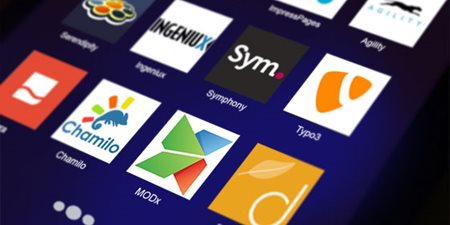A Review and Comparison of Ten Emerging CMS Platforms
By Lynette Sawyer
January 14, 2019
Agility, Chamilo, Cloud, CMS, Content Management System, Dotclear, Drupal, ecommerce, ImpressPages, Ingeniux, kentico, MODX, Mura, Serendipity, Symphony CMS, TYPO3, WCM, Web Content Management, WordPress
Wordpress, Drupal, Kentico – we all know the names of some of the top web CMS platforms out there, but that doesn’t mean there aren't many possible lessor known platforms that will deliver on your needs. In my previous post, I looked at the Top CMS Players, Trends and Marketshare, and in our upcoming  podcast, our media reporters discuss the 2019 market trends of web content management (WCM) systems.
podcast, our media reporters discuss the 2019 market trends of web content management (WCM) systems.
Although these may be some of the top players, that does not mean that they are the platform for you. Highlighted in many of our posts regarding CMS and WCM, the recurring theme is for businesses to choose the best platform that meets all their needs and requirements. Forgo the big brand names and choose one that will deliver not on your technical needs, but integrates with your customer journey, digital marketing and sales needs. As perfectly put by CMSC Media Senior Reporter and Marketing Manager, Laura Myers, “the importance of this decision however, should not be underestimated because your WCM system is arguably the core of your digital business, housing and disseminating the digital content supporting all of your needs in terms of brand presence, digital marketing, ecommerce and basically the entire experience you want to provide your customers.”
In this post, I discuss some of the top 10 emerging web content management platforms that are part of this ever-growing market.
Agility
Agility is a cloud-based content management platform. It empowers businesses to manage websites, integrates eCommerce and personalization to help drive sales and marketing. This platform offers businesses of all sizes unlimited flexibility in visual design and the overall architecture of your website. Agility has one of the most robust third-party lists of integrations that cover all digital and technical needs including ecommerce, social, storage, servers and more.
Agility’s additional benefits and top features include:
-
Consistently being rated year over year as one of the top cloud-based CMS platforms
-
A data capture approach to accelerate growth with a reimagined form builder that is not only visually beautiful, but beautifully captures leads at all touchpoints of your customer journey
-
Say goodbye to, or reduce your maintenance and support fees with its easy design and content management updates, that can be completed anywhere and anytime via the cloud
-
Speed up your development with customizable workflows or use it out of the box which is tested and true
We recommend this for: Cloud-based businesses
Ingeniux
Take an agile approach to content management with Ingeniux. Self-proclaimed as the “agile platform for content management”, Ingeniux is built on an agile, mobile-first architecture platform to manage and deliver content to any channel or device. One of its features which makes it standout from other CMS systems is its intelligent in-context content editor (ICE). The editor allows you to roll over all editable regions and when selected, easily update text, images, components, dates and other contextual fields via the WYSIWYG editor. As for the intelligent part, the editor recognizes and preserves the structure of the content through a clear separation between content and presentation supports while still delivering an intuitive page-based editing experience.
Ingeniux’s additional benefits and top features include:
-
A bootstrap foundation responsive page builder
-
A UI/UX and teamwork focused digital asset management system to manage all media and files across your website, including collaboration tools to review, edit and approve
-
A content-as-as-service ability to create, manage and deliver content within the CMS and externally to multiple channels including social media, mobile, and apps.
We recommend this for: Content driven/editorial focused businesses
Serendipity
Serendipity is an opensource, PHP powered weblog engine that can be used to build and maintain websites truly for any purpose – but has mainly been used for blogs. What's more is, Serendipity has a simple yet powerful interface which permits the easy editing and management of blog content, and supports English, German, Danish, and French languages. Its biggest draw for its use is the platforms capability to accept, send, and automatically detect trackbacks and pingbacks.
Serendipity’s additional benefits and top features include:
-
Ability to customize with the use and integration of plugins to modify the features and functionalities of the weblog engine
-
A robust editing interface which lets users easily prepare content for their blogs
-
Anti-spam features
We recommend this for: Bloggers
Dotclear
The second CMS platform that is heavily leveraged by bloggers is Dotclear. Widely used and adopted by large blogging websites, Dotclear is interestingly enough very popular among French speaking countries. Started as a one man show, this platform has widely spread to a large team of diverse developers to enhance this CMS. This platform is intended to provide a user-friendly tool allowing anyone to build a blog.
Dotclear’s additional benefits and top features include:
-
Ability to handle multiple blogs at one time
-
Integration and use of Wiki or XHTML syntax for blog entries
-
Ability to add pages that are independent from the flow of entries and support for several database types, such as MySQL, PostgreSQL, SQLite
We recommend this for: Bloggers
ImpressPages
The drag and drop of CMS platforms, ImpressPages, is built on a PHP framework. More of a developers CMS, it is built on globally recognized PHP components so there is an engine under the hood that is easily and quickly customizable. Developers can write plugins and themes to suit their own business or potential customers’ needs. The key piece that makes ImpressPage standout is its commitment to website management made easy with a true inline editing and drag&drop interface. Businesses can edit pages as you see them, not from somewhere under the hood.
ImpressPages’ additional benefits and top features include:
We recommend this for: Corporations with technical and development expertise
Chamilo
For an animal of a different color (or changing colors that is), Chamilo is the fully-fledged CMS system designed for e-learning. In fact, Chamilo claims they can get teachers and trainers set up one-fifth of the time quicker than using any other CMS platforms. With developments into adaptive assessment, social and mobile learning, skills management and many more other topics, Chamilo has adopted an innovation and high-technology first approach all within a free software platform.
Chamilo’s additional benefits and top features include:
-
Ease of use and ability to create educational content
-
Ability to track users results, to influence content, program and methodology improvements
-
A clean, user focus designed interface to not take away from users learning
-
Diverse set of features and tools for different forms of learning including visual, auditive, practical, serious games, staff selection
-
Extensive documents management capabilities
We recommend this for: eLearning hubs and websites
MODX
Join the revolution with MODX, one of the world’s fastest, most flexible, scalable and secure Open Source PHP CMS. A scalable and customizable solution, this platform targets site builders and owners, B2B users and enterprises. One of the key components of MODX is how it was built and architected for speed. They understand the importance of how site speed can affect not only the development and delivery of your website, but how it can impact your marketing, ecommerce and sales or users.
MODX’s additional benefits and top features include:
-
Enhanced built in security, with a core development of making maintenance on your site quick and easy
-
A highly available (HA) design to scale your site
-
Ability to serve many super admins, adapting to the different parts of your organization with different authoring and content governance constraints
We recommend this for: Enterprise organizations
Mura
Mura is a modern CMS that was built to serve content managers, content contributors, marketers, developers and IT pros. This platform was developed to effectively create and manage the digital experience, but also one that helps developers & IT professionals thrive. If you are looking for a CMS that makes it easier and faster for people to build and update websites, Mura is built for you.
Mura’s additional benefits and top features include:
-
Integrated design components like calendars, sidebars and forms empower even the first-time users to create a content-rich site
-
One click upgrades for future Mura CMS releases
-
Flexible templating and dynamically-generated CSS hooks
We recommend this for: Enterprise organizations
TYPO3
Deemed as the most professional CMS system (no that’s not a typo), TYPO3 is a flexible open source enterprise content management system. A key feature of this platform is its ability to manage, develop and provide speed for large, multinational websites. In fact, some of their clients include Mercedes Benz and Sony. It also has a large global community backed by approximately 900 members of the TYPO3 Association.
TYPO3’s additional benefits and top features include:
-
Easily create scalable multisite, multilingual installations for global campaigns and organizations
-
Connect anything through its open, adaptable, pluggable, decoupled architecture
-
Built for speed to engage and convert a user
We recommend this for: Multinational corporations
Symphony CMS
Harmonize your development and content with Symphony CMS, an XSLT-powered open source content management system that is built for very high delivery environments – much like their high-profile clients including Heineken, BBC, Virgin Radio. Symphony is built with an approach to content management that is simple and open.
Symphony’s additional benefits and top features include:
-
Complete control over data structure, URL schemas and every bit of markup needed
-
Ability to integrate and use some of the most popular APIs with the easy to use XML data engine
-
A robust extensions library
We recommend this for: High traffic/delivery websites

Lynette Sawyer
Lynette Sawyer is a Web Project Manager for Falcon-Software, a digital web agency founded in 1994. For the last 13-years Lynette has been in various digital capacities and her expertise goes beyond Project Management. Lynette brings experience and knowledge in graphic design, marketing communications, project management, product management and engagement.